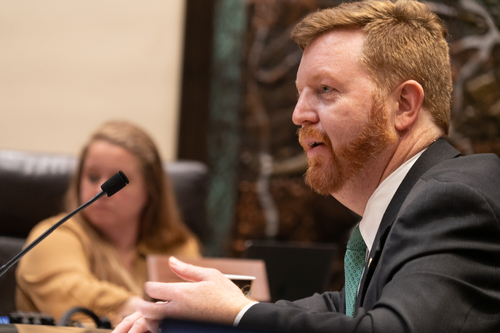Nebraska lawmaker proposes mandated notices before automatic subscription renewals

LINCOLN — With the rise of online subscriptions including newspapers, streaming platforms and magazines, many services are now offering automatic renewals.
Such arrangements allow consumers to enter an agreement where their subscription kicks in monthly or annually, but sometimes consumers forget to cancel, or the process to do is burdensome.
State Sen. John Cavanaugh of Omaha says he tried to cancel a local newspaper subscription and found that he could not do so online and instead had to make a phone call.

He introduced Legislative Bill 132, the Automatic Renewal Limitation Act, which had a hearing Tuesday before the Legislature’s Banking, Commerce and Insurance Committee. His bill would require that renewal terms be “clear and conspicuous” and that consumers would need to affirm them before entering that contract.
He called the bill a “consumer protection” measure mirroring legislation in California with “straightforward examples” of best business practices.
“I’m sure everyone can think of a time when we tried to cancel a subscription and were told you could only do so by calling a phone number and taking time out of your day while waiting on hold,” Cavanaugh said while noting most businesses are not like this.
Rich Otto testified in opposition for the Nebraska Retail Federation, Nebraska Grocery Industry Association and Nebraska Hospitality Association. Otto said Cavanaugh’s bill would establish prescriptive procedures that go further than all states but California.
Otto said that automatic renewal contracts are beneficial to customers and that the associations he represents would consider “reasonable” regulation so consumers get upfront information.
Under Cavanaugh’s bill, if consumers can sign up online, they could also cancel subscriptions online, which Otto said his organizations could support.
However, Otto also said the answer lies more in policies from states like Tennessee, Virginia, Oregon and New York.
“None of these extra revisions are necessary if we stick to the core principle of cost-effective, timely and easy to use,” Otto said. “Instead, we suggest replicating the most prevalent model that we see in other states.”
Businesses that are regulated by the Federal Communications Commission, Federal Energy Regulatory Commission or the Nebraska Department of Insurance as well as banks or credit unions and their subsidiaries or affiliates would be exempt.
Cavanaugh’s bill also includes a civil penalty of up to $2,500 if businesses violate the act.
He said this is meant to dissuade “unfair business practices,” such as failing to provide a lack of notification prior to renewal or having an otherwise burdensome cancellation process.
“It’s just trying to make it not a financially beneficial situation to make it hard to cancel,” Cavanaugh said.
Cavanaugh said with more people opting in for automatic renewal policies, some businesses may trick consumers by way of frustration to hang on just a little longer.
“You try to cancel a service and they make it hard to find the phone number, make it hard to contact them and they make it hard to cancel, and so then you put off cancellation for another month or another month until you find you get so frustrated and they’ve essentially got a lot of money out of you over that period of time,” Cavanaugh said.
Cavanaugh said his bill could be “the beginning of a final solution” and committed to working with stakeholders on a path forward, but Otto said the bill may not be the answer.
“We are open to working on this,” Otto said. “It’s not that we don’t see a path forward, we just don’t see it in LB 132.”








